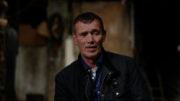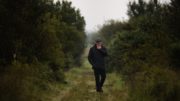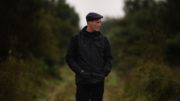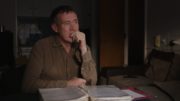Thomas was born into a Travelling family in Birr, County Offaly in 1965 where he learnt his craft of singing from his grandfather, mother, aunts and uncles. He is the inheritor of a largely undocumented song tradition among the Irish and UK’s Traveller communities and has over 1200 songs in his repertoire. The role Travellers have played in keeping many great songs alive – for everybody – has been crucial in shaping the folk tradition as we know it.
At the age of 10, Thomas left Birr and moved to London with his siblings and mother and lived in a halting site under the A40, the Westway, in West London, where Travellers still live today. Parish registers show that they have had associations with the area for at least two centuries, and definite links can be found as far back as 1800. Thomas’s mother Mary McCarthy, herself an exceptional singer had a stall on the Portobello Road market for over 40 years,
Thomas would often return to Ireland to stay with his grandfather for months at a time and travelled the length and breadth of Ireland and England over and over again. “My grandfather would take us off when we were young in the wagon, down to Clare and he’d have all the songs that the old Clare people had. If you hadn’t a Traveller, the word didn’t spread. The most essential thing they brought around was the news, before the radio and television and telephone.”
Finbarr Spain from Birr is an old friend of the McCarthys. “People travelled for many reasons that time, following the seasonal work. But the McCarthys were business people, traders and a lot of the songs that Thomas’s mother got, came from them. When they travelled they didn’t just bring back goods and horses, they were great listeners and they had great retention and great recall. The oral tradition was the tradition. In the summer time they’d go across the country, to the Aran Islands, and would walk the foals back across the country, and sell to the farmers. But along the way they heard great yarns. There was no-one going up into these out of the way places but the McCarthys and they would be picking up those little songs and stories that no-one else had.”
Thomas adds “Every farmer needed a Traveller, a Tinker, that’s what our people were called, metalworkers. They could take a sheet of metal and make anything out of it. So they were essential until the use of plastic. The tinsmith became obsolete in the ‘70s when the farmers didn’t need them anymore. That country life, that way of living, was wiped out.”
“My uncle John took all the young fellas from Birr out hunting every Sunday. You’d be at your destination at 6 o’clock in the morning, so you’d get up real early, and you could walk up to 30 miles. And other times we’d go off, and you might pick mushrooms out the Tullamore Road. And all the fruits… wild strawberries, victoria plums from the trees, nuts, cobnuts…”
During the course of the film Thomas sings many songs, some known and some far less known, even among the traditional music circles; Lough Erne’s Shore, McKenna’s Dream, Johnny Carey, Lady Margaret, What Put the Blood and Donal Kenny to name a few. We also hear Thomas’s own song Moving us on Again and his grandfather’s song The Round Top Wagon.
“I started writing the songs down about 15 years ago. I knew when my mother was ill I’d better get these songs down. Otherwise they would have all been lost. My mother was a song collector. She was collecting when she was in Ireland when she was very young, when she was a little girl. Later on in life she lost her voice with emphysema and she could only whisper. I knew she wouldn’t be around forever and I’d better start getting these songs down. My brother and sister would look after her during the day, and me and my other sister would look after her during the night. So I’d sit down with her every night, and she made it her life’s work to remember the songs. I had 12 years of that. All in all, between the whole lot of them, I have over 1200 songs. Between her and my uncle it would have been a good half of them. The way I sing is the way I was taught, my mother sang like that, her father sang like that. We do what we call a warble, in England they call it vibrato.”
The film moves between London where Thomas lives and Ireland and we accompany Thomas as he sings in festivals like Drimoleague Singing Festival and as he meets other singers on his travels. In 2021, Thomas initiated a song collecting project with the Travelling community in conjunction with the Irish Traditional Music Archive so these wonderful songs can be gathered before they are lost forever. “We were so lucky Travellers held onto these songs longer, than the people who live in the houses. That’s what it’s about, passing it on so it doesn’t die. Can you imagine those old songs not being sung? I think it would be a sin, and I mean that. Fabulous songs. And you know when you’re gone, they will continue. And that’s amazing.”
Other people who feature in the programme include the great sean nós singer from Connemara Sarah Grealish, the Traveller singer Kathleen Ward, and we hear old audio recordings of Kitty Cassidy and John ‘Jack’ O’Reilly.
A BAI Sound & Vision funded documentary produced by Harvest Films.
Director: Pat Collins Producers: Vanessa Gildea, Sharon Whooley
Editor: Keith Walsh. Camera: Keith Walsh






